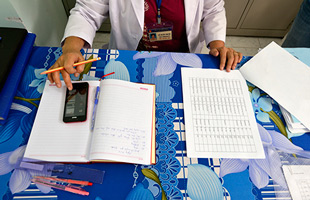 Over the past decade, the global mobile phone revolution has inspired thousands of global health innovation projects. In order to overcome barriers in scaling-up programmes, clinicians and public health practitioners have been working with non-governmental
organizations and governments to leverage the ubiquity of phones and connectivity across once-remote, rural populations. A major obstacle to widespread adoption of these mobile health (mHealth) innovations at scale has been the absence of guidelines
from normative bodies. This lack stems from the want of quality reporting to provide an evidence-base on mHealth work which is being done around the world.
Over the past decade, the global mobile phone revolution has inspired thousands of global health innovation projects. In order to overcome barriers in scaling-up programmes, clinicians and public health practitioners have been working with non-governmental
organizations and governments to leverage the ubiquity of phones and connectivity across once-remote, rural populations. A major obstacle to widespread adoption of these mobile health (mHealth) innovations at scale has been the absence of guidelines
from normative bodies. This lack stems from the want of quality reporting to provide an evidence-base on mHealth work which is being done around the world.
To address this lack, WHO collaborated with a team, which includes researchers from John Hopkins Global mHealth Initiative and the WHO Department of Reproductive Health and Research including HRP’s mHealth Technical Evidence Group (mTERG), to develop standard criteria for reporting findings from research and innovation implementation. This resulted in the mHealth Evaluation, Reporting and Assessment (mERA) checklist, which represent the first step in this direction – recently published in The BMJ.
The mERA checklist seeks to standardize the reporting of mHealth findings and to promote the expansion of the evidence base by:
- supplementing existing reporting standards to provide a concrete checklist of criteria specific to reporting on digital innovations; and
- elaborating on the existing criteria to support high-quality methodological reporting of evidence.
This checklist will be added to a growing library of standards – from large clinical trials to observational studies – which have helped research to progress significantly. The reporting checklist also aims for better comparisons between research findings, as well as to combine experiences across different settings to advocate for innovations which can improve patient experiences around the globe.
- Access the article
BMJ 2016;352:i1174
